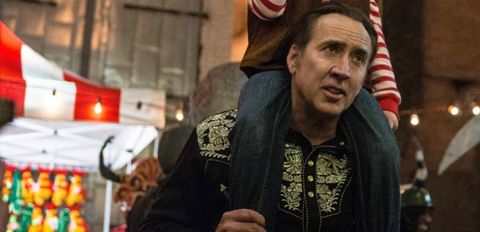In recent years, Nicolas Cage has become the butt of many jokes for his scenery chewing, general overacting, and a willingness to appear in all manner of projects you never heard of, no matter how dubious, just to earn a buck. As much as he’s become a punch line, he still occasionally delivers performances, like his turn in David Gordon Green’s Joe, that remind you that this man did win, and totally deserved to win, an Oscar.
Cage’s latest, the supernatural horror flick Pay the Ghost, falls in between the two ends of the spectrum. His performance never veers to the manic hyperactive screeching about “the bees” like in The Wicker Man, but that’s not to say he doesn’t ham it up from time to time. Directed by Uli Edel (The Last Exit to Brooklyn), the movie finds itself in a similar situation, generally walking a subdued, creepy line, but with bursts of craziness that occasionally go overboard.
Mike Cole (Cage) is an English professor with a more or less idyllic life. Sure he works too much, and he’s stressed out waiting to find out if he’ll get tenure, but he has a lovely wife, Kristen (Sarah Wayne Callies, The Walking Dead) and a devoted son, Charlie (Jack Fulton), who occasionally sees spooky things in the darkness, like a raggedy woman who ominously points at him and then disappears. There is a hint that maybe Mike used to drink too much, that there’s some darkness lurking somewhere, but it’s mentioned once and forgotten about. All of this changes, however, when at a Halloween carnival, Charlie says something spooky about how they need to “pay the ghost,” and vanishes into thin air.
What follows is a predictable string of events that most viewers will see coming a mile off. This puts a strain on Mike and Kristen’s relationship, and a year later he has moved out. He shirks his duties as a teacher, and has become obsessed with finding his son. On his way down the rabbit hole, he pesters overworked cops, runs down any possible lead, and, a few days before Halloween, he starts hearing and seeing Charlie everywhere. Realistically, you’re supposed to wonder if this is real or if Mike is simply losing his grip, but it’s obvious there is something more going on, and as he follows the clues, he stumbles onto a centuries-old supernatural mystery.
Where Pay the Ghost is the strongest is in the look and feel of its settings. Taking place in New York, Edel and company use the city to nice effect, creating a dark, dismal atmosphere with sinister overtones that fit the subject matter. The Halloween carnival provides an opportunity to showcase all manner of spooky imagery, though at times it does go a bit overboard, straying into silly territory.
The threat in Pay the Ghost is vague and mystical, and I get the impulse to keep this shrouded, but for most of the movie, you wonder if the filmmakers will ever actually clue you in to what’s going on. They do eventually, but by that time, late in the film, it comes in the form of two massive, not to mention convenient, information dumps that are not only overwhelming, but stop the film dead in its tracks just when it needs to move the most.
For his part, Cage isn’t at his most overwrought here, but he’s not at the top of his game either. Mostly Mike is a super-animated, engaging teacher who bounces around his classroom reading Goethe—no joke, his students clap for him after a lecture. Early on, that’s when he’s at his best—it’s nothing spectacular, but he’s a solid father with some issues. After Charlie disappears, however, he starts somehow overacting and not at the same time. While he himself may be quiet, his facial expression is most certainly not; he wears an over exaggerated expression of anguish and pain like ghoulish mask through the final two acts.
Pay the Ghost is weird enough to keep it moderately entertaining at times, but only barely. What strangeness there is doesn’t show up until too late to save the picture, and it too often falls back on generic, unimaginative horror tropes—many lights flicker, doors slam, and shadows linger across walls. It’s a movie you watch, that fills up some time, and then you never need to think about again. Pay the Ghost isn’t bad, but it just isn’t good either.
Most Popular






